Vortrag und Diskussion
A Reproductive Justice Approach to Transnational Feminism
Surrogacy Biomarkets in India
Dr. Sheela Saravanan
(Anthropology Heidelberg)
Montag, 29.05.2017 - 18:15 Uhr
P204 (Philosophicum)
The increasing cross-border movement offering reproductive technologies such as surrogacy and sex selective abortions have challenged the fundamentals of the reproductive liberty and human rights framework. Some of the most popular destinations for surrogacy have been and are transitional economies with comparatively permissive regulations such as; India, Nepal and Ukraine. The human development index and income inequalities in these destinations have raised ethical questions of exploiting the needs of the poor particularly where disadvantaged participants enter into unjust surrogacy contracts. Global markets based on the supply of ‘free-of-cost’ or cheap and uncomplicated wombs have been rationalized as a solution to ‘infertility’ and as a reduction to the ‘profound socio-economic inequalities’. Some liberals including liberal feminists have argued that procreative rights should include third person reproduction such as surrogacy and restricting this would be a violation of reproductive liberty. However, pregnancy contracts that put the contract mothers through social stigma, psychological challenges, violation of her bodily integrity and moreover their health, freedom, liberty and even life at stake cannot be considered a solution for infertility and inequalities. With a reproductive justice framework, I argue that this motherhood market works against social justice, is a violation to basic human rights and does not conform to the broader reproductive health-rights-justice framework.
 Dr. Sheela Saravanan has 2 Masters from Indian Universities of Bombay and Pune in Geography and Development Planning. Her Ph.D. thesis from Queensland University of Technology, Brisbane, Australia in Public Health was on the influence of biomedical frameworks of knowledge on local birthing practices in India. She has worked and published on the status of reproductive health in South Asia, violence against women and female infanticide in India earlier and now specializes on new and assisted reproductive technologies in the context of Asia and Europe. She has worked in research institutions in Chennai, Pune and Delhi. Since 2007 she has been working in the German Universities of Heidelberg, Bonn and Goettingen. She has published on global injustice, exploitation and objectification in the process of commercial surrogacy in India. Since January 2016 she is working at South Asia Institute, Heidelberg University researching on prenatal diagnosis and selective abortions practices in Germany and India. She has applied theories of embodiment, global justice, authoritative knowledge in her research.
Dr. Sheela Saravanan has 2 Masters from Indian Universities of Bombay and Pune in Geography and Development Planning. Her Ph.D. thesis from Queensland University of Technology, Brisbane, Australia in Public Health was on the influence of biomedical frameworks of knowledge on local birthing practices in India. She has worked and published on the status of reproductive health in South Asia, violence against women and female infanticide in India earlier and now specializes on new and assisted reproductive technologies in the context of Asia and Europe. She has worked in research institutions in Chennai, Pune and Delhi. Since 2007 she has been working in the German Universities of Heidelberg, Bonn and Goettingen. She has published on global injustice, exploitation and objectification in the process of commercial surrogacy in India. Since January 2016 she is working at South Asia Institute, Heidelberg University researching on prenatal diagnosis and selective abortions practices in Germany and India. She has applied theories of embodiment, global justice, authoritative knowledge in her research.
